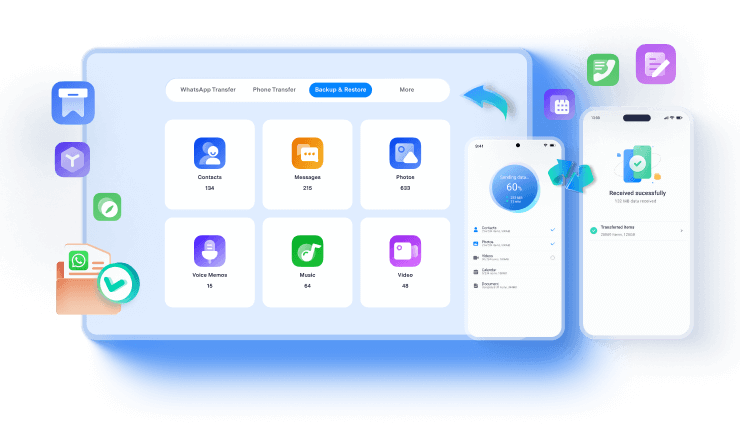Multiple methods are available that allow users to move their media and other important files from one device to another. Yet, many people are unsure which method to choose or how to begin the process without losing the data. As for people who are moving from an older device to a newer one of the same brand, the availability of multiple options makes it more confusing.
Therefore, this guide will specifically discuss the best methods that allow users to transfer data from Samsung to Samsung. You will learn about simple solutions, which involve both wired transfers and wireless options to securely move to another device. In addition to these simple transfer options, you will discover dedicated tools that work without restrictions and allow the smooth transfer of all data between devices.
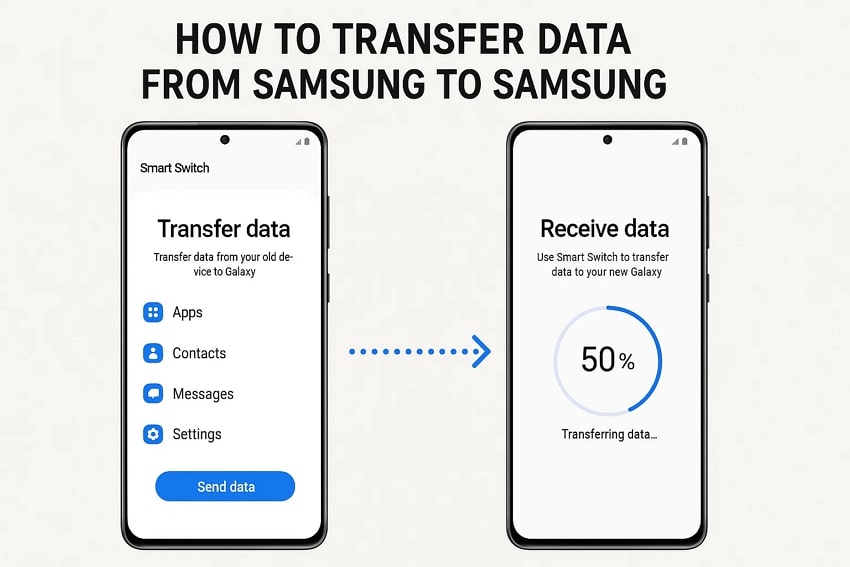
-
- Method 1. Using MobileTrans for Comprehensive Data Transfer
- Method 2. Employing Samsung Smart Switch for Official Data Migration
- Method 3. Leveraging Nearby Share for Quick File Transfers
- Method 4. Sending Files via Email for Remote Transfers
- Method 5. Moving Data to New Device via USB Cable
- Method 6. Opting for Google Backup and Restore for Cloud-Based Transfers
- Method 7. Restoring Samsung Cloud Backup for Data Migration
Part 1. Comparative Analysis of Samsung to Samsung Data Transfer Methods
Before discussing the solutions in detail, let’s compare them to see which one stands out as the best. So, go through the detailed comparative analysis shared below to pick the best way to transfer data from Samsung to Samsung:
| Method | Best For | Limitations | Speed |
| MobileTrans | All-in-one data migration with backup and restore. | Paid plan | Blazing-fast |
| Samsung Smart Switch | Samsung-only transfers | Samsung-only ecosystem | Fast with a cable |
| Nearby Share | Fast sharing of small files | 1GB limit, no app/messages transfer | Speed depends on file size |
| Sending small files remotely | 25MB size limit | Depends on internet | |
| USB Cable | Transferring larger files directly | No app or message support | Very fast |
| Google Cloud Backup | Cloud-based migration during setup | Setup-only restore | Depends on the internet; usually slow with large data |
| Samsung Cloud Backup | Cloud backup inside the Samsung ecosystem | Samsung-only; discontinued in some regions | Depends on the internet; usually slow with large data |
From this comparison, it is clear that MobileTrans should be preferred to move your files to your new device. Its support for almost all devices and various data types, including fast transferring speed, makes it the ideal choice among the competitors.
Part 2. 7 Methods to Transfer Data from Samsung to Samsung
Although the table simplifies the whole discussion and makes it easier to choose a data-transferring option, let's discuss the available methods in detail for further insights:
Method 1. Using MobileTrans for Comprehensive Data Transfer
Best For: Comprehensive transfer and backup of data between all phone types without any internet connection.
As the best third-party solution to move data between devices, MobileTrans allows the migration of over 18 data types between different operating systems. Its extensive support for over 6000 different mobile phones ensures users can benefit from it without restrictions. The tool facilitates the movement of iCloud data to a different Android device without any operating system restrictions. Users can also transfer and merge their WhatsApp messages using this tool.
Apart from the desktop solution, you can also utilize the mobile application of this tool to migrate 18+ types of data between devices. MobileTrans App eliminates the need for any third-party desktop intervention, which makes the transfer process more secure. Furthermore, the average transfer speed of 30MB/s ensures the Samsung to Samsung transfer happens quickly, without using any mobile data or an active internet connection.
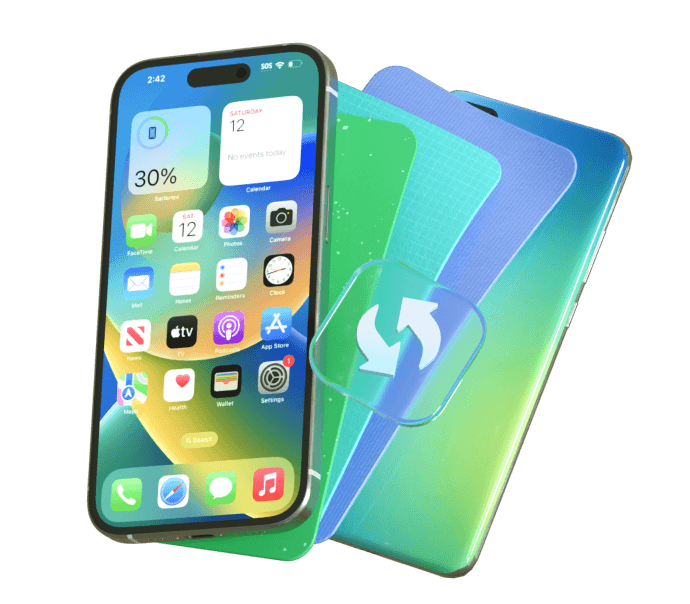
Detailed Guide to Using MobileTrans for Comprehensive Data Transfer
You can learn about the best way to transfer data from Samsung to Samsung using this tool with these steps:
Step 1. Utilize the Phone to Phone Transfer Feature
Connect the old and new phones to the PC. Launch MobileTrans and enter the “Phone to Phone” tab.
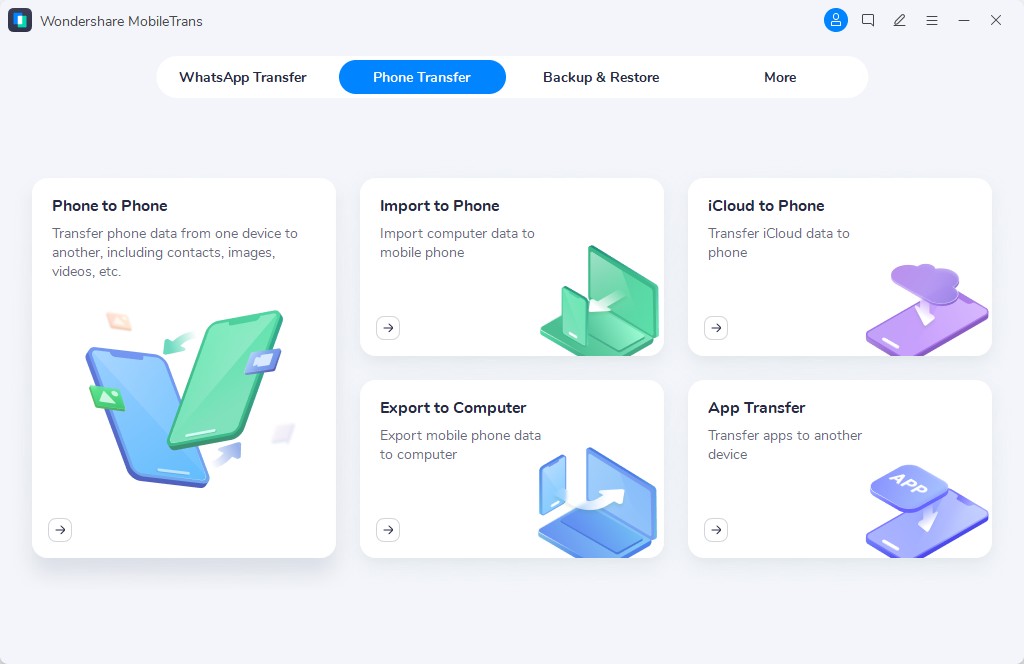
Step 2. Choose the Transfer Direction and the Data to Transfer
Press the “Switch” button to change the transfer direction. Select data types and press the “Start” button.

Step 3. Remove Devices Once the Process Completes
Once the data is transferred, disconnect your old and new Samsung smartphones.
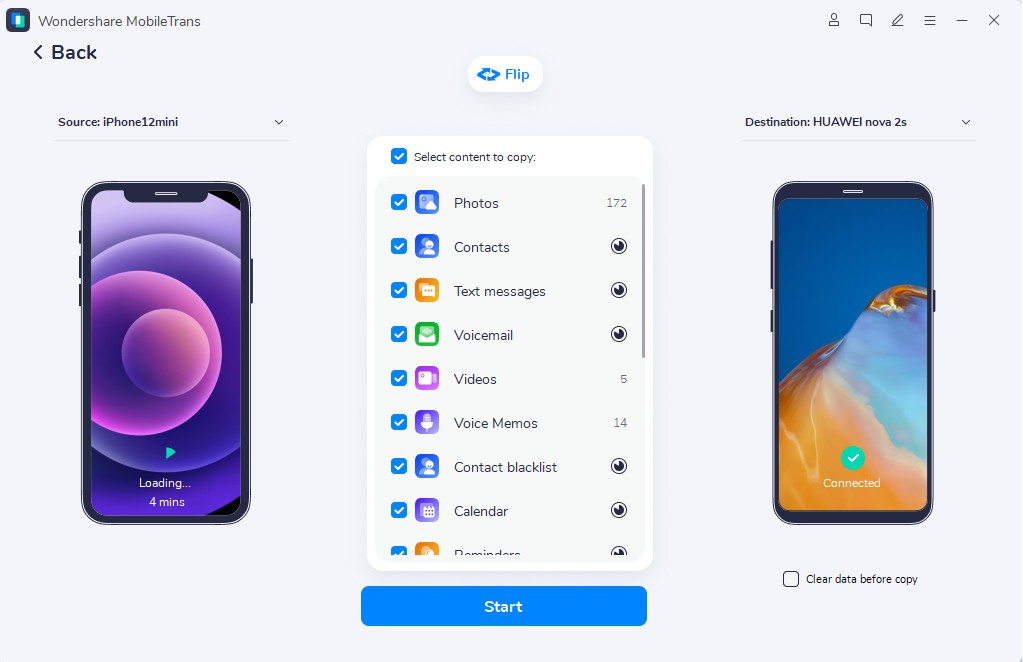
Method 2. Employing Samsung Smart Switch for Official Data Migration
Best for: Those who prioritize security and official transfer means.
As an official and dedicated resource to move data and specific device settings between Samsung devices, Smart Switch allows secure migration to your new phone. Since it supports both wireless and cable transfers, the tool is a flexible option for different situations. Other than big data, the Smart Switch Samsung to Samsung transferring tool also allows moving contacts and call logs, as shown in this guide:
Step 1. Access the “Send from This Phone” button on the old device. Select the “Cable” transfer option.
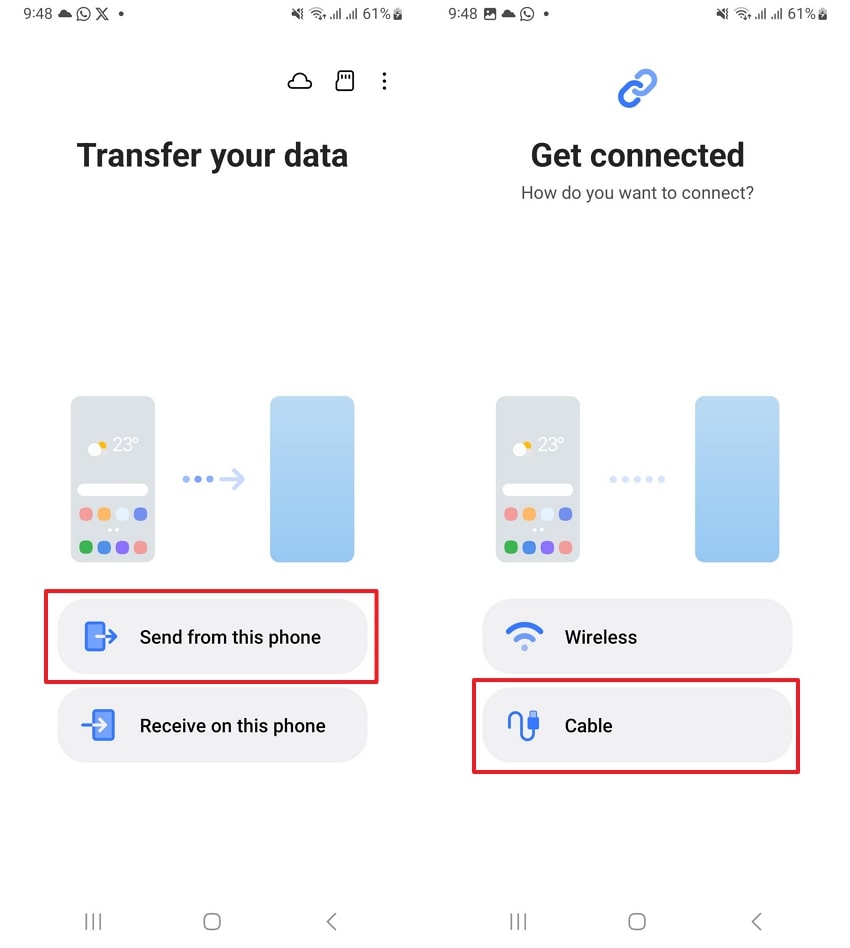
Step 2. Press the “Receive on this Phone” on the new phone. Use a cable to connect both phones.
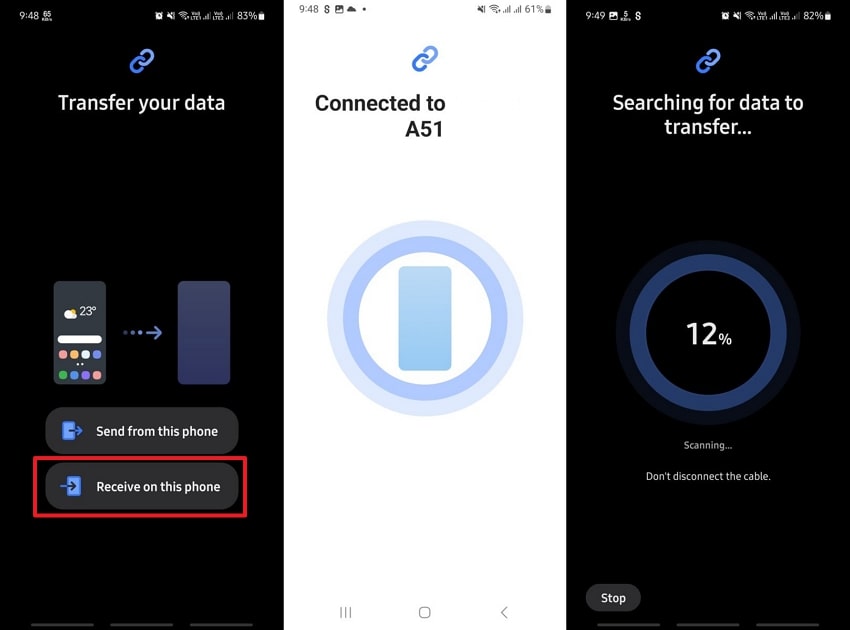
Step 3. Choose “Custom” and press the “Next” button. Mark all the data types and hit the “Transfer” button.
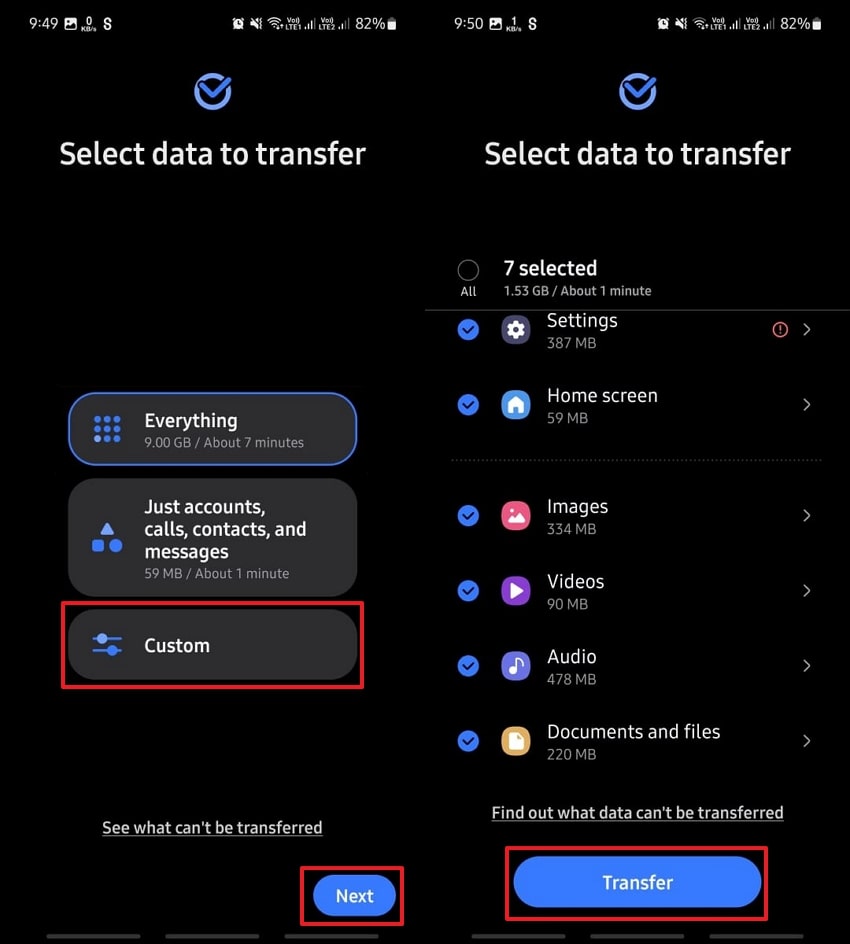
Method 3. Leveraging Nearby Share for Quick File Transfers
Best For: Quick transfer of small files without any app installations.
The Nearby Share mode is now renamed to Quick Share on Android devices and allows the transfer of data using Bluetooth and QR scans. With this built-in feature, users can migrate their files and even contacts to a different device. One can use this solution in Airplane mode if their Bluetooth is working. You can learn to transfer content from Samsung to Samsung using this method with these steps:
Step 1. Select the files and hit the “Share” button. Choose “Quick Share.”
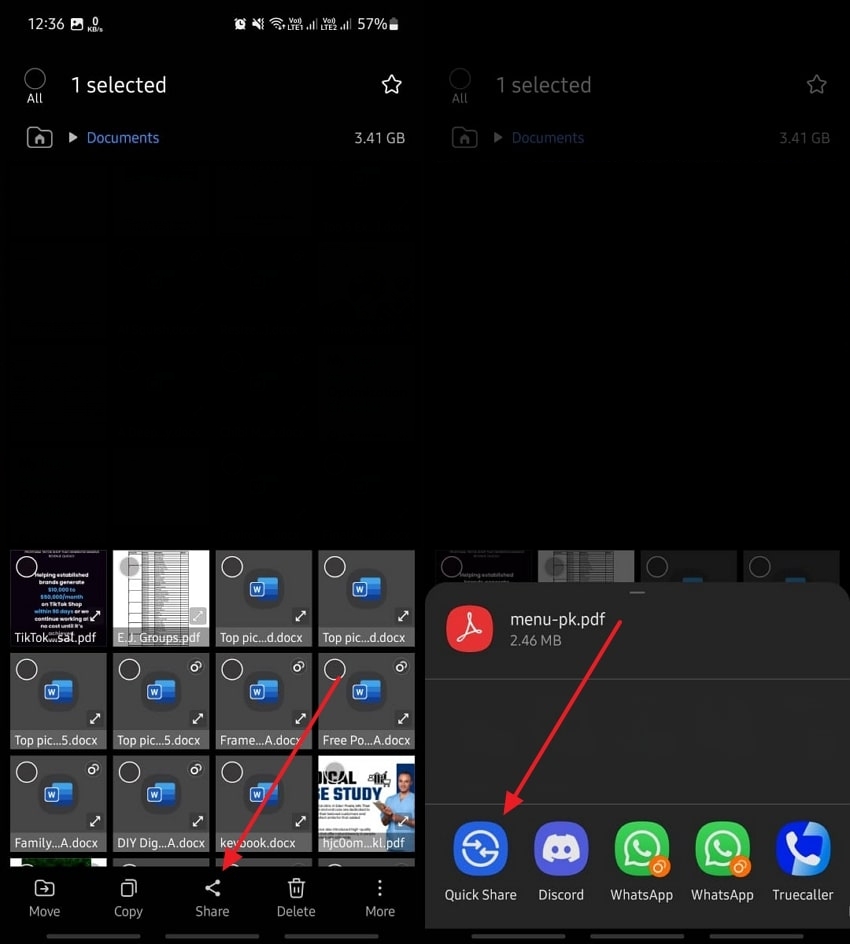
Step 2. Press the “Turn on Bluetooth” button. Tap the receiver device to send the files.
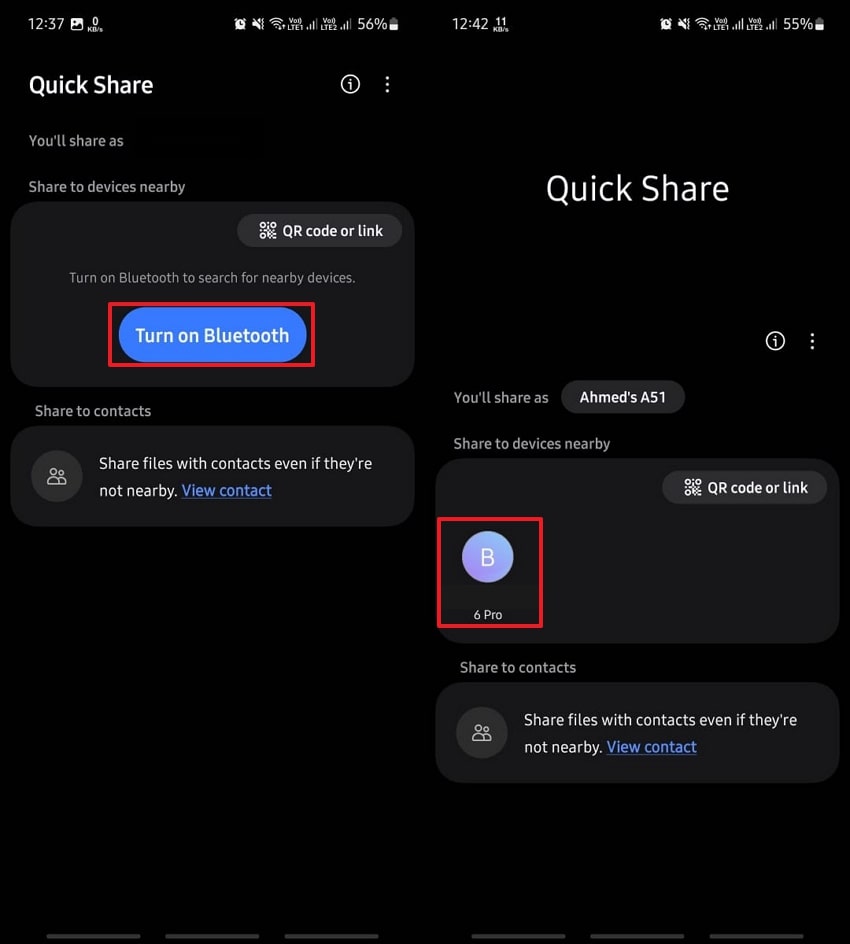
Step 3. On the receiver’s end, select “Everyone” and hit “Done.” Then, press the “Accept” button.
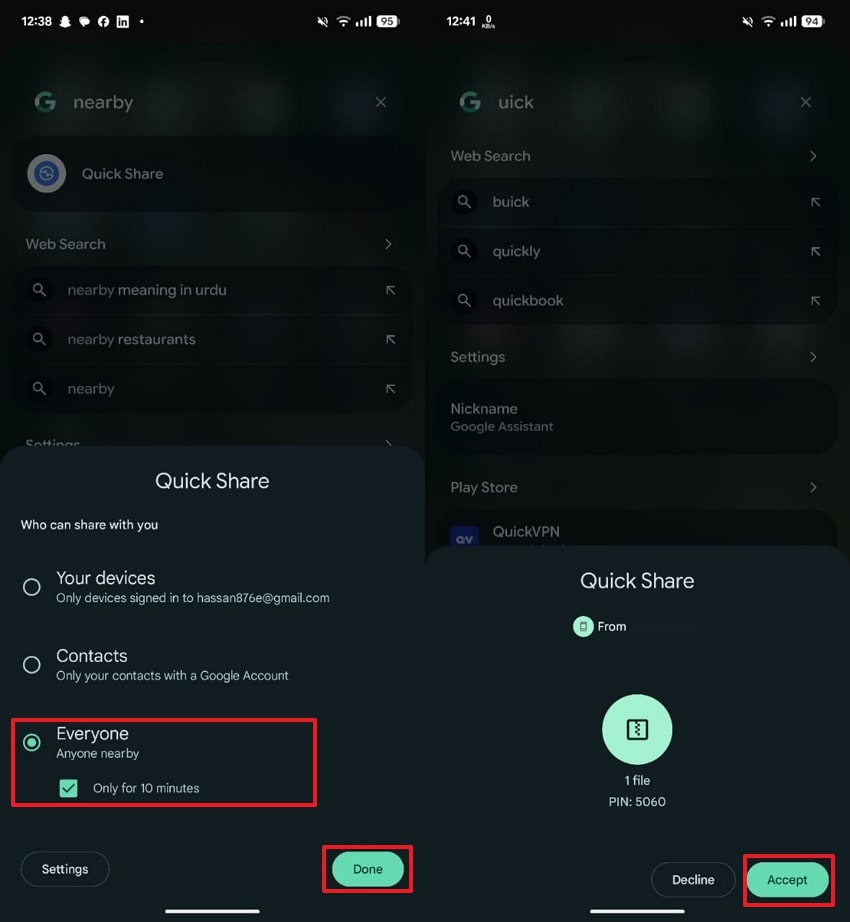
Method 4. Sending Files via Email for Remote Transfers
Best For: Secure transfer of files to a distant device.
Although not the primary transferring mode, you can still use your email to migrate files to your new device. This method is useful when you don't have physical access to the new device, and you need to transfer files remotely. Files can be downloaded later, and emails stay saved for future access. So, learn how to transfer data from Samsung to Samsung without Smart Switch using email with these steps:
Step 1. Select the files and press the “Share” button. Choose “Gmail.” Enter the targeted person’s email and hit “Send.”
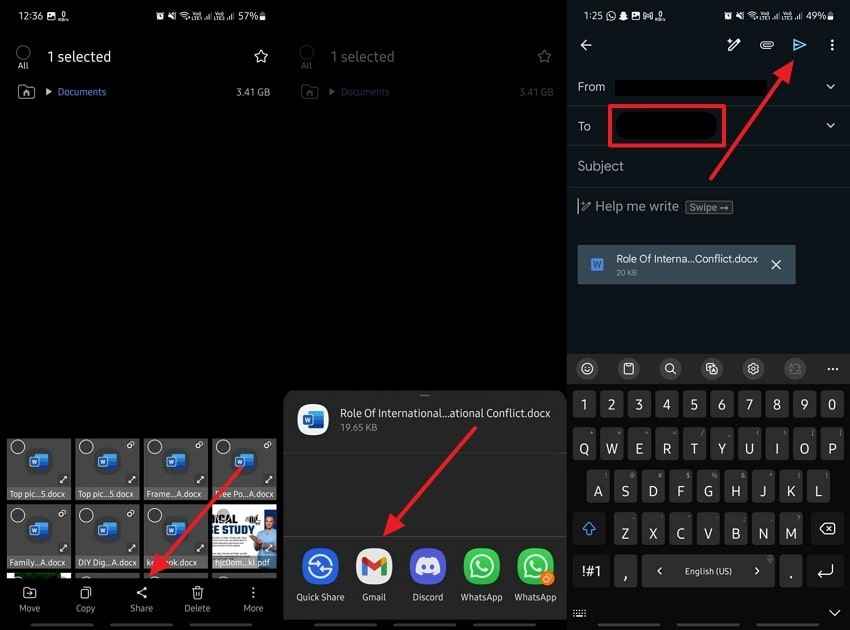
Step 2. Open the mail and press “Download” beside the file.
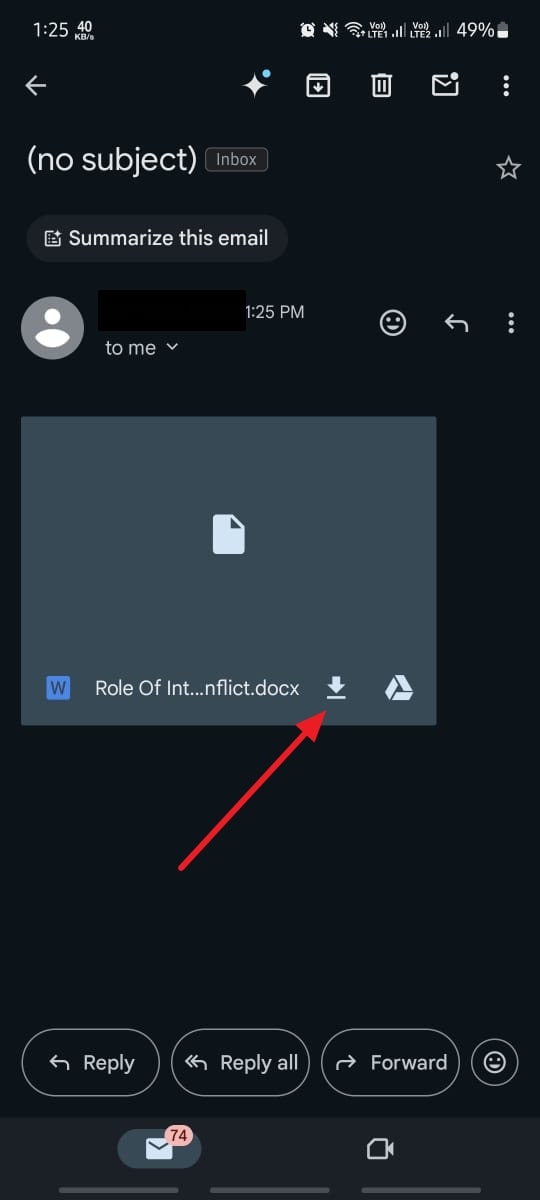
Method 5. Moving Data to New Device via USB Cable
Best For: Direct movement of large amounts of data between devices.
A more secure option is to use a direct wired connection between both phones to migrate your data and other files. Many phones support file transfer through the charging cable using the File Transfer option. This method is recommended when the files are larger in size and when you need to move data privately. Use the following steps to transfer content from Samsung to Samsung using a wired connection:
Instructions. Connect both phones using a direct cable connection. Select the Targeted files > Press the “Three Dots” > Choose the “Copy To” option. Then, enter the desired folder and press the “Copy” button.
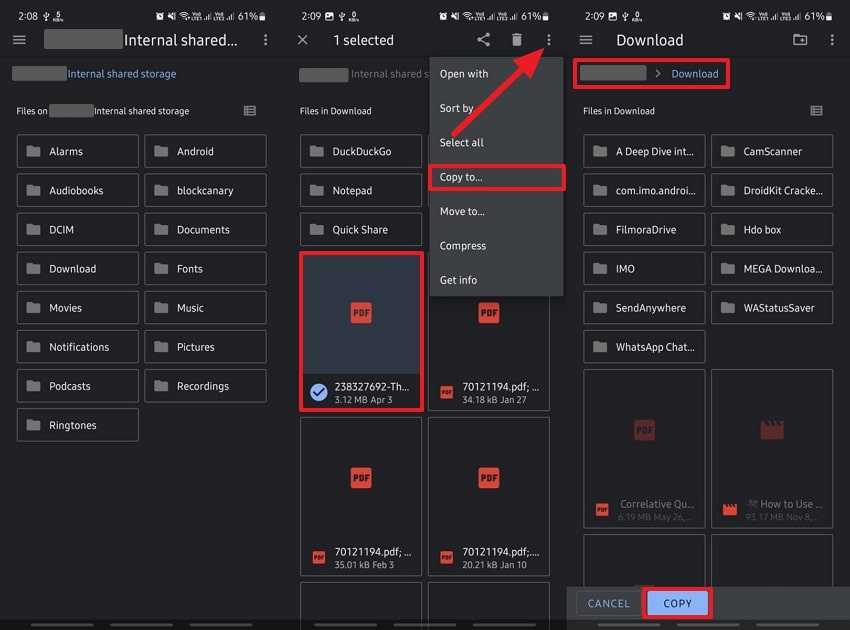
Method 6. Opting for Google Backup and Restore for Cloud-Based Transfers
Best For: Safe storage of data and restoring it to new devices.
Since all Android devices come with Google’s services, you can use its cloud backup and restore options to move your data between devices. It is a secure option since the method uses a single account to sync your data across phones. With this method, you can move your calendars and other minor details that other solutions miss. Thus, follow these steps and check how to transfer data from Samsung to Samsung:
Step 1. Reach “Google” in settings and press the “Manage Backup” button. Then, hit the “Backup Now” button.
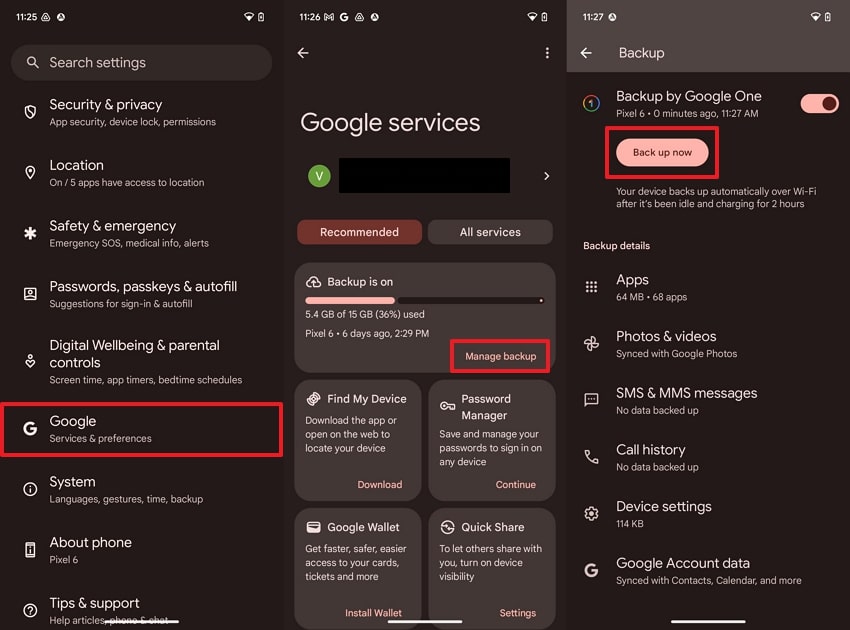
Step 2. On your new device, log in to your Google account while setting it up. Press “Next” on the “Copy Apps and Data” screen. Select the backup to restore.
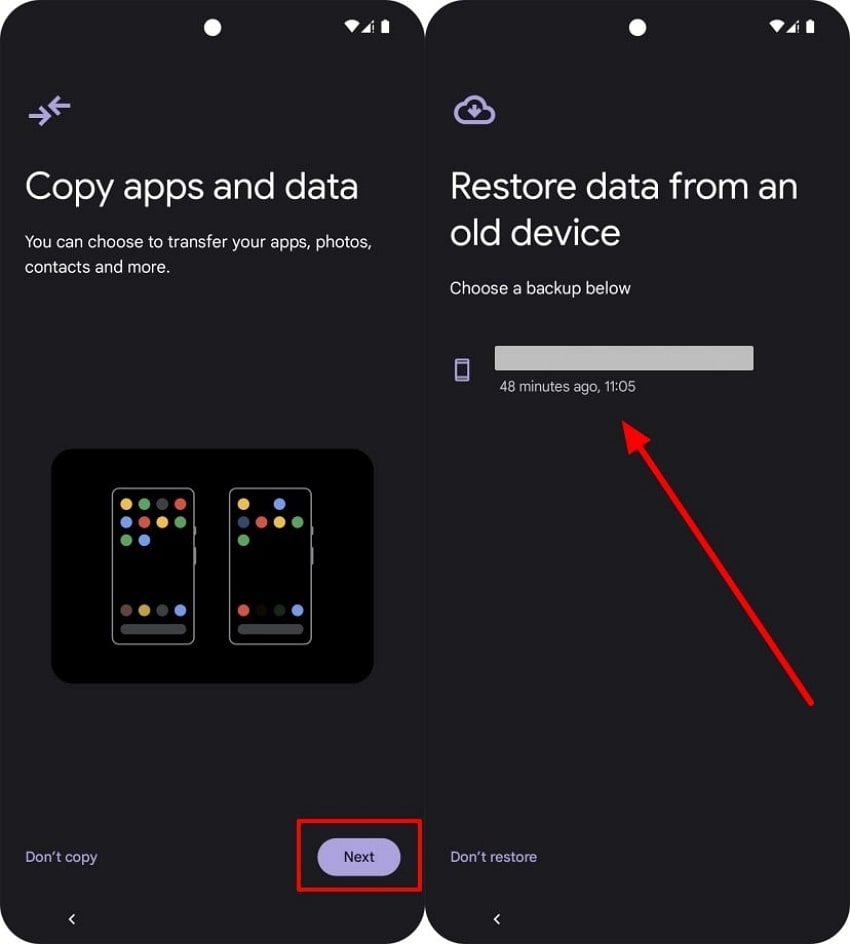
Method 7. Restoring Samsung Cloud Backup for Data Migration
Best For: Data backup and restoring it within Samsung’s ecosystem.
Like Google, users also get cloud backup and restoring options from Samsung, which stores all the device data, including alarm details and screen layouts. Once you enable backup on the older phone, your data will be uploaded to the cloud and accessible anywhere with the right credentials. Users can learn how to transfer data from Samsung to Samsung without a Smart Switch with this method through these steps:
Step 1. Tap your “Samsung Account” in settings. Access “Samsung Cloud.” Enter the “Restore Data” option.
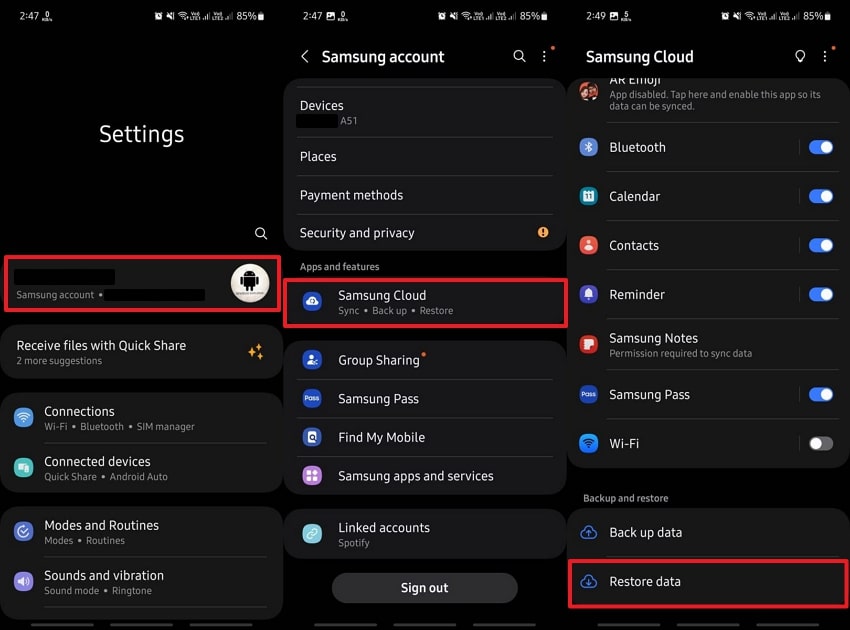
Step 2. Choose the available backup. Select the data and press the “Restore” button.
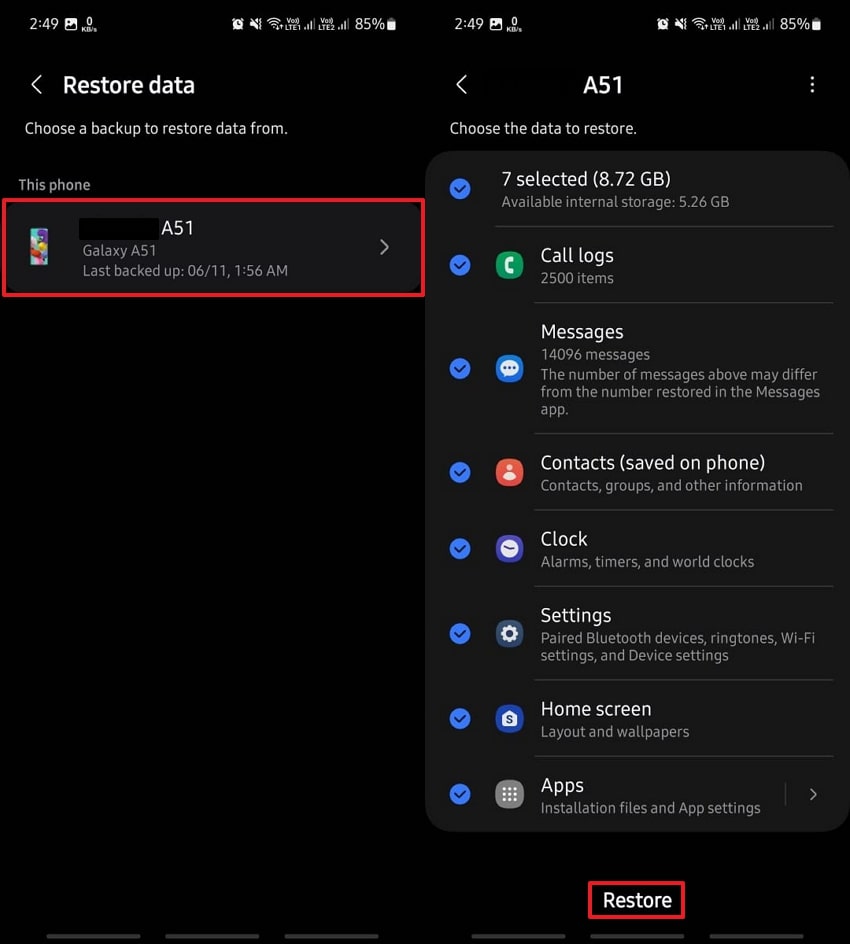
Conclusion
To conclude, users can find multiple ways to transfer data from Samsung to Samsung securely and without any trouble. Dedicated solutions like Smart Switch work best for Samsung’s ecosystem, while USB transfers allow quick migration of large data files. While cloud storage options also exist, using third-party tools like MobileTrans is recommended due to their enhanced features and migration support.
FAQs
-
Q1. Can I move apps and games with login info?
A: While not all solutions offer this feature, some advanced tools might transfer applications with their login information. Tools like MobileTrans are recommended, especially when you need to move the messaging apps and their data. Such solutions allow you to access not only the data but also the login details and the conversations.
-
Q2. Is it possible to move data from a broken phone?
A: In many cases, it is possible to extract data from a damaged phone, but it depends on the extent of the damage. Data recovery specialists use advanced tools and software that read data from damaged phones and copy it to another storage location. Since this is risky work, it is better to ensure cloud backups are enabled to avoid data loss.
-
Q3. Are there any risks of data corruption during the transfer process?
A: The possibility of data corruption or loss during the transfer process exists, but it depends on the channel you are using. Data corruption during migration usually happens when the transferring process or the downloading process is disturbed. Therefore, ensure a proper internet connection and create a backup of the files before transferring them.









